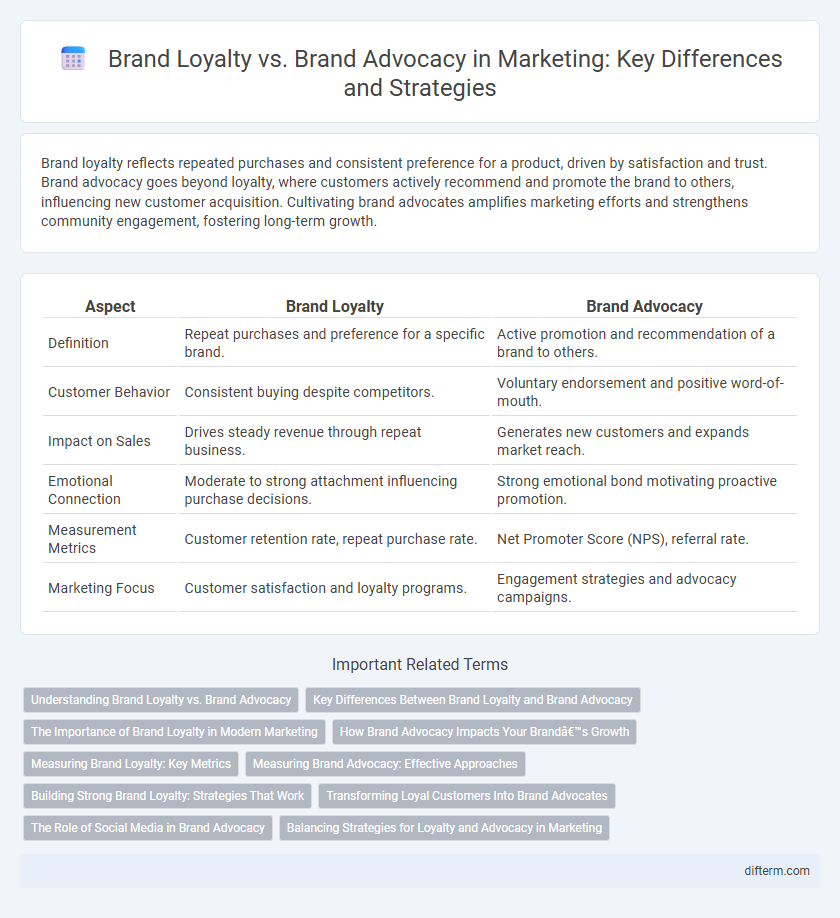Brand loyalty reflects repeated purchases and consistent preference for a product, driven by satisfaction and trust. Brand advocacy goes beyond loyalty, where customers actively recommend and promote the brand to others, influencing new customer acquisition. Cultivating brand advocates amplifies marketing efforts and strengthens community engagement, fostering long-term growth.
Table of Comparison
| Aspect | Brand Loyalty | Brand Advocacy |
|---|---|---|
| Definition | Repeat purchases and preference for a specific brand. | Active promotion and recommendation of a brand to others. |
| Customer Behavior | Consistent buying despite competitors. | Voluntary endorsement and positive word-of-mouth. |
| Impact on Sales | Drives steady revenue through repeat business. | Generates new customers and expands market reach. |
| Emotional Connection | Moderate to strong attachment influencing purchase decisions. | Strong emotional bond motivating proactive promotion. |
| Measurement Metrics | Customer retention rate, repeat purchase rate. | Net Promoter Score (NPS), referral rate. |
| Marketing Focus | Customer satisfaction and loyalty programs. | Engagement strategies and advocacy campaigns. |
Understanding Brand Loyalty vs. Brand Advocacy
Brand loyalty reflects a customer's consistent preference and repeat purchases of a specific brand, driven by satisfaction and trust. Brand advocacy goes beyond loyalty, involving active promotion and recommendations by customers to their social circles, amplifying brand reach and credibility. Understanding the distinction helps marketers tailor strategies that not only retain customers but also convert them into influential brand ambassadors.
Key Differences Between Brand Loyalty and Brand Advocacy
Brand loyalty refers to customers repeatedly purchasing a product or service due to consistent satisfaction, while brand advocacy involves customers actively promoting the brand through word-of-mouth and social sharing. Loyal customers may stick with a brand for convenience or habit, whereas advocates demonstrate emotional connection and influence potential buyers by endorsing the brand. Key differences include the passive nature of loyalty compared to the proactive behavior of advocacy, which drives organic growth and stronger brand credibility.
The Importance of Brand Loyalty in Modern Marketing
Brand loyalty drives repeat purchases and increases customer lifetime value, making it a crucial metric in modern marketing strategies. Loyal customers not only provide steady revenue but also reduce acquisition costs by consistently choosing a brand over competitors. Cultivating brand loyalty enhances customer trust and creates a solid foundation for sustained business growth.
How Brand Advocacy Impacts Your Brand’s Growth
Brand advocacy drives brand growth by transforming satisfied customers into passionate promoters who actively recommend products, increasing organic reach and trust. Unlike brand loyalty, which centers on repeat purchases, brand advocacy generates genuine word-of-mouth marketing that boosts customer acquisition and retention. This positive exposure accelerates market penetration and enhances overall brand credibility in a competitive landscape.
Measuring Brand Loyalty: Key Metrics
Measuring brand loyalty involves tracking key metrics such as repeat purchase rate, customer retention rate, and net promoter score (NPS) to evaluate the strength of customer commitment. Analyzing customer lifetime value (CLV) and frequency of engagement provides insights into consistent buying behavior and emotional connection with the brand. These metrics distinguish loyal customers from advocates, who actively promote the brand beyond habitual purchasing.
Measuring Brand Advocacy: Effective Approaches
Measuring brand advocacy involves tracking customer behaviors such as referral rates, social media mentions, and Net Promoter Score (NPS) to quantify genuine enthusiasm for a brand. Tools like customer surveys, sentiment analysis, and engagement metrics provide actionable insights into how strongly customers promote the brand to others. Effective approaches emphasize identifying promoters who go beyond repeat purchases to actively recommend and defend the brand within their networks.
Building Strong Brand Loyalty: Strategies That Work
Building strong brand loyalty requires consistent customer engagement through personalized experiences and superior product quality, fostering emotional connections that encourage repeat purchases. Implementing loyalty programs with exclusive rewards and meaningful incentives enhances customer retention and promotes brand preference over competitors. Leveraging customer feedback to improve offerings and maintaining transparent communication further solidify trust and long-term commitment to the brand.
Transforming Loyal Customers Into Brand Advocates
Transforming loyal customers into brand advocates requires personalized engagement strategies that deepen emotional connections and encourage authentic sharing of positive experiences. Leveraging customer feedback and exclusive rewards fosters a sense of belonging, motivating customers to promote the brand voluntarily. Brands that effectively convert loyalty into advocacy benefit from increased organic reach, higher customer retention, and enhanced reputation in competitive markets.
The Role of Social Media in Brand Advocacy
Social media platforms amplify brand advocacy by enabling consumers to share authentic experiences and positive reviews, which significantly increase trust and influence potential customers. User-generated content and influencer endorsements create a dynamic ecosystem where brand advocates drive organic reach and engagement far beyond traditional advertising. Effective brand advocacy on social media fosters deeper emotional connections, turning loyal customers into powerful brand ambassadors who actively promote the brand within their networks.
Balancing Strategies for Loyalty and Advocacy in Marketing
Balancing strategies for brand loyalty and brand advocacy requires leveraging personalized customer experiences to build emotional connections that drive repeat purchases while simultaneously encouraging satisfied customers to promote the brand organically through reviews and referrals. Implementing loyalty programs alongside advocacy incentives maximizes customer lifetime value and amplifies brand reach by harnessing authentic word-of-mouth marketing. Data-driven insights enable marketers to identify key touchpoints that nurture trust and transform loyal customers into passionate brand advocates.
Brand loyalty vs brand advocacy Infographic

 difterm.com
difterm.com